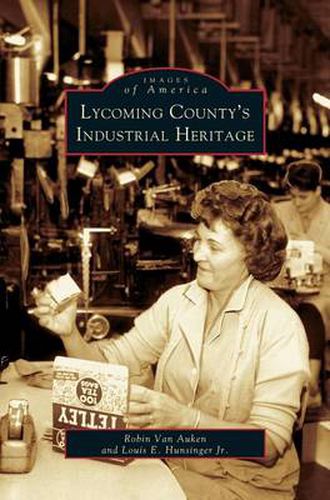Readings Newsletter
Become a Readings Member to make your shopping experience even easier.
Sign in or sign up for free!
You’re not far away from qualifying for FREE standard shipping within Australia
You’ve qualified for FREE standard shipping within Australia
The cart is loading…






This title is printed to order. This book may have been self-published. If so, we cannot guarantee the quality of the content. In the main most books will have gone through the editing process however some may not. We therefore suggest that you be aware of this before ordering this book. If in doubt check either the author or publisher’s details as we are unable to accept any returns unless they are faulty. Please contact us if you have any questions.
Lycoming County has a rich industrial history, first in lumber and then in manufacturing. Thousands were employed as lumberjacks, and others worked in sawmills, planing mills, or furniture factories that processed the lumber. Until 1894, lumber was the county’s main industry. Inevitably, the mountainsides were denuded and floods toppled the remaining lumbering companies. The heyday over, many
company towns collapsed. Boards of trade were created to entice manufacturers to the region. During the first half of the twentieth century, Lycoming once again prospered with hundreds of new entrepreneurs and companies. Lycoming County’s Industrial Heritage documents the people who worked in the factories, mills, and for the manufacturers that no longer exist, victims of recession, urban sprawl, and offshore industries. Each image honors the role of labor and
serves as a reminder of the individuals who helped build industrial America.
$9.00 standard shipping within Australia
FREE standard shipping within Australia for orders over $100.00
Express & International shipping calculated at checkout
This title is printed to order. This book may have been self-published. If so, we cannot guarantee the quality of the content. In the main most books will have gone through the editing process however some may not. We therefore suggest that you be aware of this before ordering this book. If in doubt check either the author or publisher’s details as we are unable to accept any returns unless they are faulty. Please contact us if you have any questions.
Lycoming County has a rich industrial history, first in lumber and then in manufacturing. Thousands were employed as lumberjacks, and others worked in sawmills, planing mills, or furniture factories that processed the lumber. Until 1894, lumber was the county’s main industry. Inevitably, the mountainsides were denuded and floods toppled the remaining lumbering companies. The heyday over, many
company towns collapsed. Boards of trade were created to entice manufacturers to the region. During the first half of the twentieth century, Lycoming once again prospered with hundreds of new entrepreneurs and companies. Lycoming County’s Industrial Heritage documents the people who worked in the factories, mills, and for the manufacturers that no longer exist, victims of recession, urban sprawl, and offshore industries. Each image honors the role of labor and
serves as a reminder of the individuals who helped build industrial America.